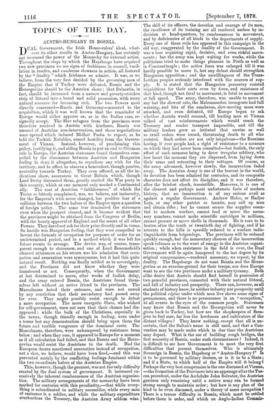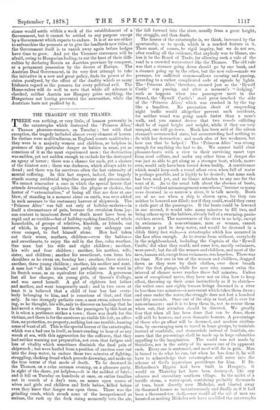TOPICS OF THE DAY.
AUSTRO-HUNGARY IN BOSNIA.
DUAL Government, the Irish Home-rulers' ideal, what- ever its other results in Austro-Hungary, has certainly not increased the power of the Monarchy for external action. Throughout the steps by which the Hapsburgs have acquired two new provinces we see signs of feebleness in council, vacil- lation in resolve, and cumbrous slowness in action, all fostered by the " duality " which Irishmen so admire. It was, as we believe, from the very first decided by the governing men of the Empire that if Turkey were defeated, Bosnia and the Herzegovina should be the Austrian share ; that Dalmatia, in fact, should be increased from a narrow and poverty-stricken strip of littoral into a broad and solid possession, with every natural resource for becoming rich. The two Powers most directly concerned—Russia and Germany—assented to the acquisition, which it was well known that the remainder of Europe would either approve or, as in the Italian case, re- signedly accept. The Slav refugees from the provinces were therefore received in Austria with kindness, Russia was assured of Austrian non-intervention, and those negotiations were opened which induced Midhat Pasha to expect, as he told the Turkish Notables, armed hostility from the Govern- ment of Vienna. Instead, however, of proclaiming this policy, justifying it, and aiding Russia to put an end to Ottoman rule in Europe, the Austrian statesmen found themselves com- pelled by the dissonance between Austrian and Hungarian feeling to deny it altogether, to repudiate any wish for the territory, and to affect to observe a benevolent, though passive, neutrality towards Turkey. They even offered, as all the in- dications show, assurances to Great Britain which, though Lord Derby distrusted them, greatly excited the War party in this country, which at one moment only needed a Continental ally. The root of Austrian "faithlessness," of which the Tories so bitterly complained, was, we believe, not insincerity, for the Emperor's wish never changed, but positive fear of a collision between the two halves of the Empire upon a question of foreign policy. The same fear dominated the statesmen even when the prospect cleared, and it became evident that the provinces might be obtained from the Congress of Berlin, with the hearty approval of England and the assent of all other Powers. They dared not ask for their prize directly and in terms. So hostile was Hungarian feeling, that they were compelled to invent the formula of occupation for purposes of order for an undetermined period, and in a method which it was left for future events to arrange. The device was, of course, trans- parent enough to statesmen, and one of Lord Beaconsfield's clearest utterances on his return was his admission that occu- pation and annexation were synonymous, but it had this quite natural result. Nothing was finally settled as to sovereignty, and the Provinces did not know whether they were transfeiTed or not. Consequently, when the Government at last determined to move, after weeks of foolish delay, and the army entered Bosnia, the Austrians found them- selves left without an active friend in the provinces. The Mussulmans hated their entrance, and were not cowed by any conviction that their ascendancy had passed away for ever. They might possibly resist enough to defeat a mere occupation. The more energetic Slays, who wished for self-government, were not sure that their chance had dis- appeared; while the bulk of the Christians, especially in the towns, though friendly enough in feeling, were under a terror lest any demonstration should bring upon them the future and terrible vengeance of the dominant caste. The Mussulmans, therefore, were unhampered by resistance from below ; and when they rose, it appeared to Europe for a moment as if all calculation had failed, and that Bosnia and the Herze- govina would resist the Austrians to the death. Had the European decree sanctioned annexation instead of occupation, not a shot, we believe, would have been fired,—and this was prevented mainly by the conflicting feelings dominant within the two co-ordinate halves of the Austrian Empire.
This, however, though the greatest, was not the only difficulty created by the dual system of government. It increased ex- cessively the inherent cumbrousness of the Austrian organisa- tion. The military arrangements of the monarchy have been marked for centuries with this peculiarity,—that while every- thing is subordinated to military necessities, while every man of eminence is a soldier, and while the military expenditure overburdens the Treasury, the Austrian Army seldom wins. I The skill of its officers, the devotion and courage of its men, the excellence of its training are all rendered useless by in- 1 decision at head-quarters, by cumbrousness in movement, I and by deficiencies of all kinds in the departments of supply. Every one of these evils has appeared in this campaign in the way, exaggerated by the duality of the Government. It was a case requiring rapid, decisive, and even riskful move- ments; but the army was kept waiting for weeks, while the politicians tried to make things pleasant in Pesth as well as- , in Constantinople ; the active force was enlarged till it was hardly possible to move it, lest any defeat should strengthen. Hungarian opposition ; and the unwillingness of the Trans- Leithan peoples seriously interfered with the sources of sup- ply. It is stated that the Hungarian peasantry resisted. ! requisitions for their carts even by force, and resistance of • that kind though not fatal to movement, is fatal to movement at full speed. The army, therefore, was unable to move at any but the slowest rate, the Mahommedan insurgents had full warning, and bits of the cumbrous, slow-moving mass were attacked, and even defeated, till Europe began to ask. whether Austria would succeed, till leading men at Vienna talked of vast reinforcements which would crush the Treasury and render transport impossible, and till the military leaders grew so irritated that unwise as well as cruel orders were issued, threatening death to all who resisted. Such orders are not only iniquitous—the Bosniana having, if ever people had, a right of resistance to a measure on which they had never been consulted—but foolish, the only effect of such menaces being to deter irregular soldiery, who, lose heart the moment they are dispersed, from laying down their arms and retreating to their cottages. Of course, as the army advanced, however slowly, the insurrection faded away. The Austrian Army is one of the bravest in the world, its devotion has been admired for centuries, and its composite character does not affect its discipline, and it was therefore, after the briefest check, irresistible. Moreover, it is one of the clearest and perhaps most unfortunate facts of modern history, that no insurrection is of any serious avail as against a regular Government. Andrew Hofer, or Hadjee Loja, or any other patriot or fanatic, may call up men and obtain rifles ; but he cannot secure the supplies essen- tial to modern warfare, cannot feed or move the neces- sary numbers, cannot make scientific cartridges in millions-, cannot procure or move shells in thousands. He is sure to be beaten after the tenth or twentieth day of fighting, and if he retreats to the hills is speedily reduced to a warfare indis- tinguishable from brigandage. The provinces will be reduced quickly enough, but the momentary chances of the insurrection speak volumes as to the want of energy in the Austrian organi- sation; while when resistance in the field is over, the Dual Government will be again hampered to the last degree by its original compromises,—rendered necessary, we repeat, by the duality. The Hapsburgs do not want Bosnia and the Herze- govina as an exercise-ground for their troops, nor does Europe want to see the two provinces under a military tyranny. Both alike desire that Austria should find herself in possession of two peaceful provinces, connected with their natural littoral, and full of industry and prosperity. There can, however, as all students of history know, be neither industry nor prosperity until the political re'ginte under which men live shews some signs of permanence, and there is no permanence in an "occupation," at all events in the eyes of the common people. Statesmen may know that Bosnia and the Herzegovina will never be given back to Turkey, but how are the shopkeepers of Sera- jevo to feel sure, far less the herdsmen and cultivators of the distant villages ? They know nothing, except that all is un- certain, that the Sultan's name is still used, and that a Con- vention may be made under which in due time the Austrians may depart. What is the use of building rough bridges, the first necessity of Bosnia, under such circumstances ? Indeed, it is difficult to see how Government is to meet the very first difficulties that present themselves. Who is ultimately Sovereign in Bosnia, the Hapsburg or "Austro-Hungary I" Is it to be governed by military decrees, or is it to be a State ; and if a State, to which half of the Empire will it belong? Perhaps the very best compromise is the one discussed at Vienna, —the formation of the Provinces into an appanage after the Tus- can precedent, under the Archduke John Salvator, the Austrian garrison only remaining until a native army can be formed strong enough to maintain order ; but how is any plan of the kind to be even discussed, under a theory of mere occupation? There is a tenure difficulty in Bosnia, which must be settled before there is order, and which an Anglo-Indian Commis.. sioner would settle within a week of the establishment of a Government, but it cannot be settled to any purpose except by a Government which expects to endure. It is of no use either to enfranchise the peasants or to give the landlords new titles, if the Government itself is to vanish away again before hedges have time to grow. And yet the Viennese statesmen will be afraid, owing to Hungarian feeling, to cut the knot of their diffi- culties by declaring Bosnia an Austrian province by conquest, .or a permanent possession by the decree of Europe. The Austrian Dual Government, in its very first attempt to take the initiative in a new and great policy, finds its power of de- cision paralysed, by the effect of the duality which so many Irishmen regard as the panacea for every political evil. The Home-rulers will do well to note that while all advance is checked, neither Austria nor Hungary gains anything, the Hungarians not having prevented the annexation, while the Austrians have not profited by it.































 Previous page
Previous page